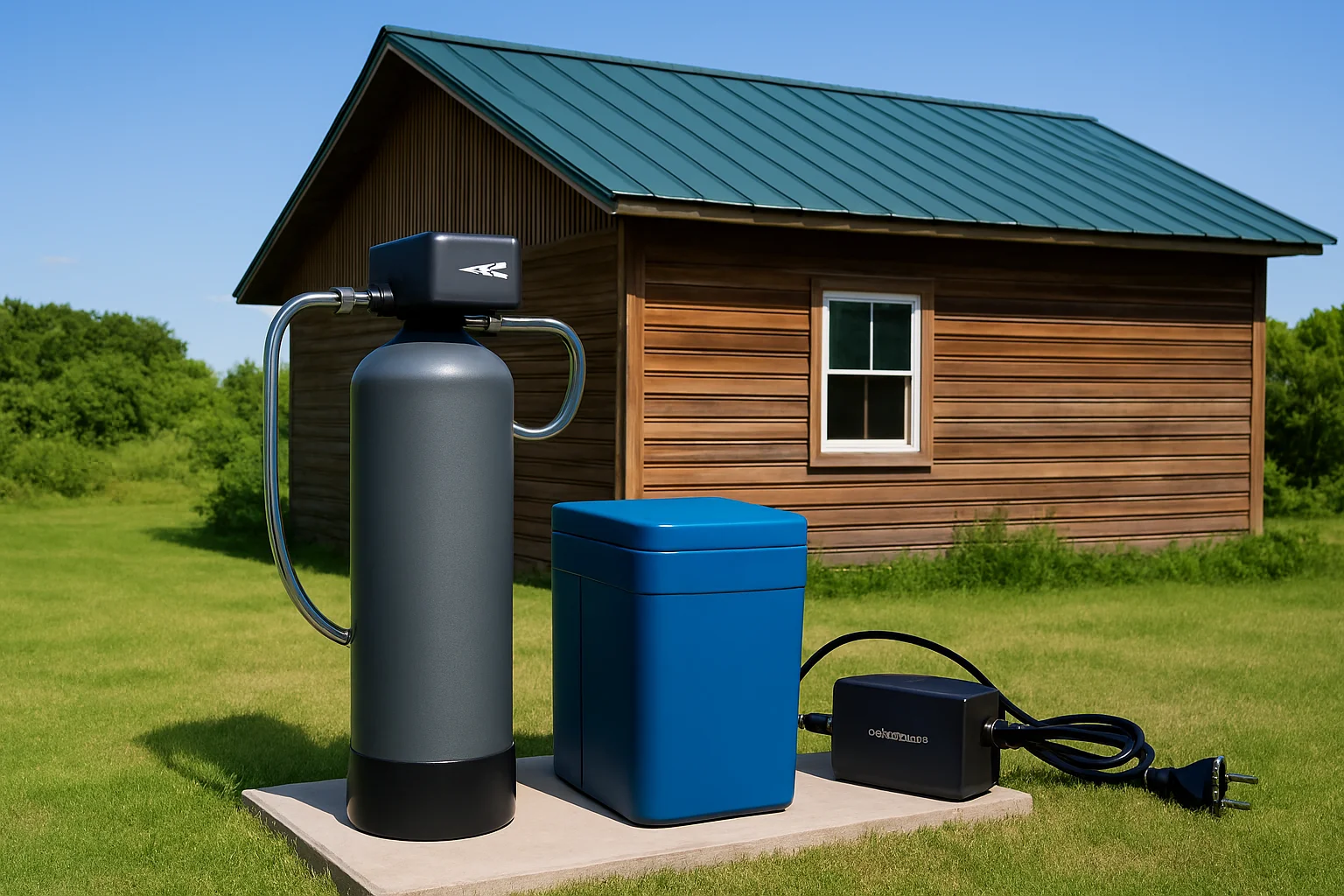What Makes Water Softening So Important for Rural Homes?
Living in a rural area, especially with well water, comes with many unique advantages, such as privacy, fresh air, and connection to nature. However, one of the challenges that rural homeowners often face is dealing with hard water. Well water, particularly in rural settings, can contain high levels of minerals like calcium and magnesium, which cause hard water. This can affect everything from the taste and appearance of your water to the efficiency of your appliances.Water softeners are the best solution for tackling hard water problems. But what are the best water softeners for well water in rural areas? This blog will explore the importance of water softeners, the different types of systems available, and the best water softeners for rural homes with well water.
Why Do Rural Homes Often Have Hard Water?
Well water sources are generally more prone to hard water compared to municipal water systems. In rural areas, wells tap into underground sources that can be rich in minerals. When the water percolates through the soil and rock, it picks up minerals like calcium and magnesium. These minerals, while not dangerous to your health, can cause a number of issues:
- Scale Buildup: Hard water leads to mineral deposits, or scale, forming inside your pipes, water heaters, and appliances like dishwashers and washing machines.
- Soap and Detergent Issues: Hard water can make it difficult for soap and detergent to lather effectively. This means you’ll need to use more soap to get the same cleaning power, and you may end up with soap scum on your dishes and in your bath.
- Skin and Hair Effects: Hard water can leave your skin feeling dry and your hair brittle and dull.
- Stained Fixtures: Calcium and magnesium can leave unsightly stains on your sinks, bathtubs, and toilets.
- Energy Efficiency Loss: Scale buildup in water heaters can reduce their efficiency, causing your energy bills to rise.
A water softener can help resolve these issues by removing or neutralizing the minerals responsible for hard water. But with so many options available, it’s essential to choose the right system for your home.
Containerized/Packaged Type Systems
What Types of Water Softening Systems Are Best for Rural Homes?
When selecting a water softener for a rural home, it’s important to consider both the water quality and your specific needs. There are several types of water softening systems, each with its own advantages and limitations. Here’s a breakdown of the most common types:
1. Salt-Based Ion Exchange Water Softeners
How Does It Work?
Salt-based ion exchange water softeners are the most common type of water softeners. They work by using a resin tank that exchanges calcium and magnesium ions in your water with sodium ions (from salt) during a process called ion exchange. Over time, the resin becomes saturated with minerals and needs to be recharged using a brine solution.
Advantages:
- Highly effective at removing hardness-causing minerals.
- Suitable for high hardness levels in well water.
- Well-established and reliable technology.
Limitations:
- Requires regular maintenance, including refilling salt.
- Adds sodium to the water, which may not be suitable for those on low-sodium diets.
Best For:
- Rural homes with high levels of hardness that need a reliable and thorough solution.
Water Quality Monitoring
Water Quality Monitoring
Water Quality Monitoring Water Quality Monitoring by WCSP: Precision for Sustainable Resource Management Water Care Services Pakistan (WCSP) offers flexible water quality monitoring programs, available on both short-term and long-term bases, tailored to meet diverse
Water Quality Monitoring
2. Salt-Free Water Softeners
How Does It Work?
Salt-free systems, also known as water conditioners, don’t actually remove minerals from the water. Instead, they alter the structure of the minerals, preventing them from bonding and forming scale. These systems often use a process called template-assisted crystallization (TAC) or another similar technology to modify the minerals and stop them from causing damage.
Advantages:
- No need to add salt, which makes it more eco-friendly.
- Low maintenance and no wastewater produced.
- Effective at preventing scale buildup but not as effective at softening water as traditional salt-based systems.
Limitations:
- Doesn’t remove minerals from the water, so it’s not as effective in areas with high hardness.
- Doesn’t reduce sodium content.
Best For:
- Homes with low to moderate hardness levels where scale buildup is the main concern.
3. Dual-Tank Water Softeners
How Does It Work?
Dual-tank systems consist of two resin tanks that work together to provide continuous soft water. While one tank is regenerating, the other tank is in use. This means you won’t experience any downtime between regenerations, providing uninterrupted access to soft water.
Advantages:
- Ideal for large homes or homes with high water usage.
- No downtime between regenerations, ensuring continuous access to soft water.
- Suitable for homes with high hardness levels.
Limitations:
- More expensive than single-tank systems.
- Larger and requires more space.
Best For:
- Larger rural homes or homes with high water consumption that need continuous access to soft water.
4. Reverse Osmosis Systems
How Does It Work?
Reverse osmosis (RO) systems use a semipermeable membrane to filter out minerals, chemicals, and other contaminants from water. RO systems are typically used for drinking water but can be incorporated into a whole-house system for rural homes, especially when combined with a pre-filtration system.
Advantages:
- Very effective at removing minerals and contaminants.
- Can be used to treat drinking water and, in some cases, the whole home.
Limitations:
- Expensive and requires significant installation and maintenance.
- Wastewater is produced during the filtration process.
- May not be necessary for softening water if you’re only concerned about hardness.
Best For:
- Homes with both high hardness and other water quality concerns, like contamination or high levels of pollutants.
What Are the Best Water Softeners for Well Water in Rural Areas?
Now that we understand the different types of systems available, let’s look at some of the best water softeners for well water in rural areas. These systems are chosen for their effectiveness, reliability, and suitability for rural homes with well water.
1. Fleck 5600SXT Water Softener System
Why It’s the Best:
Fleck is a well-known brand in the water softener market, and the 5600SXT model is one of their best-selling systems. This salt-based ion exchange system is designed to handle high levels of hardness, making it ideal for well water. The 5600SXT comes with a digital control valve, making it easy to adjust and monitor the system.
Features:
- High capacity and efficient regeneration process.
- User-friendly control panel with easy programming.
- Reliable for large households and homes with high water usage.
Best For:
- Large rural homes with high water consumption and hard well water.
2. Aquasana EQ-1000 Whole House Water Filter and Salt-Free Conditioner
Why It’s the Best:
If you’re looking for a salt-free option, the Aquasana EQ-1000 is a great choice for rural homes with moderate hardness. This system doesn’t use salt but still helps reduce scale buildup, which is a major issue in hard water areas.
Features:
- Uses a two-stage filtration system for cleaner water.
- Reduces chlorine, sediment, and scale buildup.
- Eco-friendly and requires minimal maintenance.
Best For:
- Rural homes with moderate to low hardness levels, where scale is the primary concern.
3. Fleck 7000SXT Dual Tank Water Softener
Why It’s the Best:
For larger rural homes, the Fleck 7000SXT dual-tank water softener provides continuous soft water without interruption. Its dual-tank design ensures that you never run out of soft water, making it perfect for homes with high water demand.
Features:
- Dual-tank system for continuous soft water.
- Digital control valve for easy programming.
- Efficient salt usage and regeneration process.
Best For:
- Large rural households with high water usage, where continuous soft water is essential.
4. AquaOx Whole House Water Filter
Why It’s the Best:
If you’re looking for a comprehensive water treatment system, the AquaOx Whole House Water Filter combines a whole-house filtration system with a softener. This system is effective at removing both contaminants and minerals, providing you with clean, soft water for all your household needs.
Features:
- Removes heavy metals, chlorine, and other contaminants.
- Softens water without using salt.
- Low maintenance and long-lasting.
Best For:
- Rural homes with well water that has both hardness and contamination issues.
How Do You Maintain Your Water Softener in a Rural Home?
Once you’ve chosen and installed the right water softener, it’s important to maintain it to ensure it continues working effectively. Here are some general maintenance tips:
- Regular Salt Refills: For salt-based softeners, refill the salt as needed, typically every 4-6 weeks, depending on usage.
- Check the Resin: The resin tank may need to be replaced after several years of use, depending on the quality of your water.
- Clean the Brine Tank: Over time, the brine tank can develop sludge. Clean it every 3-6 months to keep the system functioning properly.
- Test Your Water Regularly: Keep testing your well water to monitor its hardness levels. This can help you adjust the settings on your softener as needed.
Conclusion
Choosing the best water softener for well water in rural areas can make a significant difference in the quality of your water and the longevity of your plumbing. Whether you opt for a salt-based system, a salt-free conditioner, or a dual-tank solution, finding the right system for your needs ensures clean, soft water for your home.
FAQ: Best Water Softeners for Well Water in Rural Areas
Q1: How do I know if I need a water softener for my well water?
A1: If you notice scale buildup on your faucets, cloudy water, or difficulty getting soap to lather, these are signs of hard water, and a water softener is needed.
Q2: How often do I need to replace the resin in my water softener?
A2: The resin can last anywhere from 5 to 10 years, depending on water quality and usage.
Q3: Are salt-free water softeners as effective as traditional salt-based systems?
A3: Salt-free systems are effective at preventing scale buildup but do not remove minerals from the water. They are a good option for homes with moderate hardness but may not be as effective in areas with high hardness levels.
Q4: How much does it cost to install a water softener in a rural home?
A4: The cost of installing a water softener can range from $400 to $2,500, depending on the type, size, and installation requirements.
Q5: Can I install a water softener myself?
A5: Some water softeners come with DIY installation kits, but it’s often best to hire a professional to ensure the system is installed correctly and operates efficiently.



